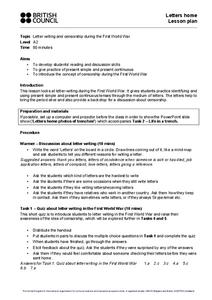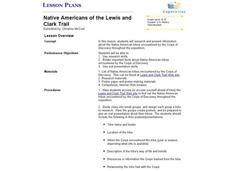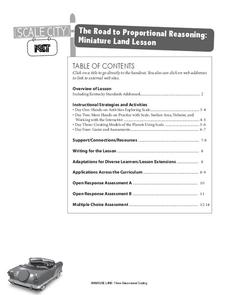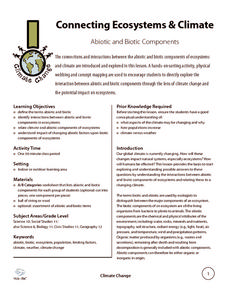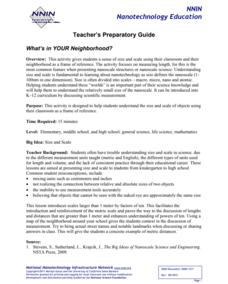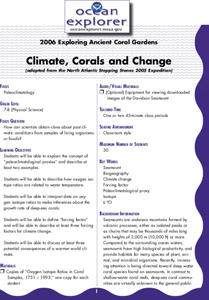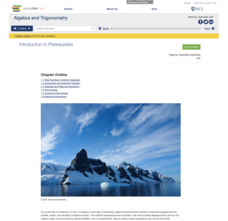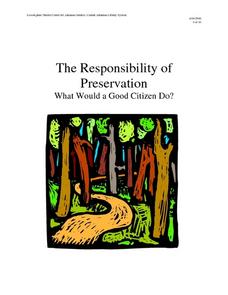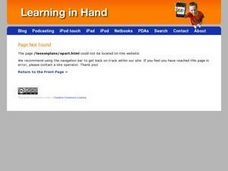Forest Foundation
Forest Watersheds
Where does the water we use come from? To understand the concept of a watershed, class members study the water cycle and then engage in an activity that simulates a watershed.
Schools Linking Network & Lifeworlds Learning
How Do We All Live Together?
Explore the concepts of community and point of view with these activities complementing the children's book Voices in the Park by Anthony Browne. Following a class reading of the story, ask students to either draw a map of the...
British Council
Letters Home
When you're writing historical fiction, the past really can become the present — especially if you're writing in the present continuous tense! Cover World War I, verb tenses, censorship, and letter writing with one informative...
Edgate
Native Americans of the Lewis and Clark Trail
As part of a study of the Corps of Discovery expedition, class groups research the different Native American tribes Lewis and Clark encountered on their journey and share their findings with the class.
Kentucky Educational Television
The Road to Proportional Reasoning
Just how big would it really be? Young mathematicians determine if different toys are proportional and if their scale is accurate. They solve problems relating scale along with volume and surface area using manipulatives. The last day of...
NOAA
A Quest for Anomalies
Sometimes scientists learn more from unexpected findings than from routine analysis! Junior oceanographers dive deep to explore hydrothermal vent communities in the fourth lesson in a series of five. Scholars examine data and look for...
Wild BC
Connecting Ecosystems & Climate
Collaborators sort a set of cards into biotic and abiotic categories. Then, as a class, they discuss their work and relate each of the abiotic components to climate change. Finally, they form a web of components by connecting those that...
National Nanotechnology Infrastructure Network
What’s In Your Neighborhood?
Chart your way to an understanding of nanoscale. Using a Google map, learners estimate a radius around their location of 1,000 and 1,000,000 meters. Predicting what 1,000,000,000 meters would look like takes them off the charts!...
NOAA
Climate, Corals and Change
Global warming isn't just an issue on land; deep ocean waters are also showing troubling signs. Young scientists learn more about deep water corals and the many recent discoveries researchers have made. Then they examine data related to...
Rice University
Algebra and Trigonometry
Move on into trigonometry. An informative eBook takes the content of a College Algebra course and adds more relating to trigonometry and trigonometric functions. The content organization allows pupils to build upon their learning by...
Curated OER
Christopher Columbus
Help first graders gain an understanding of the beginnings of our nation by learning more about Christopher Columbus. They begin by listening to a read aloud of Christopher Columbus and His Voyage to the New World (another title could be...
Curated OER
Orienteering - The Fundamentals
Students investigate the concept of a compass and it has been used in the past and in modern times. They practice using it in the wilderness in order to test its importance in various exploring activities. Each activity is accompanied by...
Curated OER
COLONIAL FLYERS/TRAVEL BROCHURES TO THE COLONIES
Students investigate concepts of history and geography in this instructional activity. They create travel brochures for travelers who are crossing the Atlantic Ocean to populate the colonies of early America. The brochure has...
Curated OER
Exploring the USA and the World with Cartograms
Middle schoolers investigate cartograms in order to explore the different countries on Earth. In this world geography activity, students use the Internet to analyze data on different cartograms. Middle schoolers compare data, such as...
Curated OER
Arthur's Tooth
Students practice their reading comprehension by reading a story in their class. In this story map lesson, students read the Marc Brown book Arthur's Tooth and discuss the story, characters and setting. Students create a story map based...
Curated OER
Trickster Tales
Students study folk tales and moral lessons from cultures around the world. In this character traits lesson, students study moral lessons through the character traits in various cultures folk tales. Students complete 11 activities...
Curated OER
Where Has It Been? Tracking the Ivory-Billed Woodpecker
By studying the assumed extinction, and subsequent rediscovery of the Ivory-billed Woodpecker, learners use maps and come up with a scenario for the rediscovery of the bird. This incredibly thorough lesson plan is chock-full of...
Curated OER
The Responsibility of Preservation
Upper elementary and middle schoolers study the case of the ivory-billed woodpecker, a bird that was once-thought to be extinct. Learners explore the responsibility of people to preserve habitats, and take care of the animals who live in...
Curated OER
Op Art and Contrast
Seventh graders create Op art designs by reading web information through FlingIt, mapping learned concepts with PicoMap, and creating how-to examples of their own Op art design by using Sketchy. They complete the lesson plan by creating...
Curated OER
Spelling Instant Activity
Sixth graders understand the usage of capital letters for mapping skills. In this capitalization lesson, 6th graders correct sentences to insert appropriate capital letters. Students select cities from the sentences and make a word puzzle.
Curated OER
Organizing Main Ideas and Supporting Details
Students read given information and identify the main ideas and specific detail of the story. In groups, they read a historical title and create a "book talk" for each one, summarizing the story. In addition, students create a...
Curated OER
Neighborhood Map Machine
Second graders study building placements in a neighborhood. They discuss businesses, roads, houses, rivers, police/fire stations, and use Neighborhood Map Machine to create a new map. They complete an exploratory map and community of...
Curated OER
Adaptations-What a Concept
Students study the pink river dolphin and how it has adapted to its environment. In this adaptations lesson students construct a map that represents certain relationships.
Curated OER
Color Enhanced Maps
Learners download or create maps with numerical weather data. They add isolines and color to create regions on their maps. They explore the visual properties of color palettes and create a visualization applying their knowledge.




